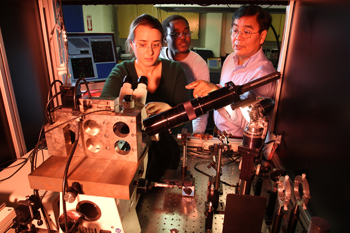Ph.D. Program

The Center for Photochemical Sciences at Bowling Green State University (BGSU) has a vibrant, world-renowned program that offers students the opportunity to perform cutting-edge research with our internationally recognized faculty.
BGSU is located in Bowling Green, Ohio, and is in the scenic Great Lakes region of the United States. It houses the Center for Photochemical Sciences, a research center that focuses on interactions of light with matter.
This is an exciting time to join the BGSU Chemistry team. We have recently added new faculty in optical spectroscopy, materials chemistry, computational chemistry, and single-molecule spectroscopy and biophysics. The Center for Photochemical Sciences at BGSU has been instrumental in contributing to the fundamental development of photo-driven chemical processes and in addressing critical environmental and energy problems over the last two decades, receiving worldwide recognition and high regards.
Goals and Objectives
- To conduct research across disciplinary boundaries
- To prepare students and professionals for careers in industry and academia
- To support established technological business through consultation and collaboration, particularly in our immediate locale, and to support the development of new business based on photoscience.
- To serve as a resource center and transfer knowledge to the broader public and scientific communities.
Admission Criteria
Admission requirements are a bachelor's degree in chemistry or a related major from an accredited college or university with a grade point average of at least 3.0 on a 4.0 scale.
Degree Completion
Students pursuing the Ph.D. degree will need about four to five years to complete the degree. Coursework is completed in the first two or three semesters, and students are encouraged to begin research as early as possible. Students will have chosen their research adviser by the beginning of the second semester.
Financial Support
Bowling Green State University and the Center for Photochemical Sciences provide full support for all graduate students in good standing, which includes tuition, fees, and a competitive stipend, currently at $29,000/yr.
Learning Outcomes
Upon completion of the doctoral degree, students in Photochemical Science are expected to be able to:
- Apply quantum mechanical methods to predict observable properties for molecular motions including translation, rotation and vibration.
- Apply quantum mechanical methods to determine molecular electronic wave functions and to characterize the molecular bonding.
- Analyze organic reaction mechanisms and the mechanistic diagrams and methods for their elucidation.
- Demonstrate an understanding of selected topics of physical organic chemistry including stereochemistry principles, and the application of reactive intermediates in chemistry.
- Analyze a wide variety of spectral data to deduce the structure of an unknown molecule.
- Analyze the generation and nature of excited states, including evolution of excited states, and radiative and nonradiative processes and energy transfer
- Demonstrate an active knowledge of experimental techniques and modern instrumentation for characterization of excited states is part of the topics covered.
- Demonstrate an active knowledge of photochemical reactions, various reaction types including absorption and emission of light, intersystem crossing, energy transfer, electron transfer and symmetry rules that govern these processes, rules for orbital symmetry governed reactions.
- Analyze different types of photoreactions including inorganic photo processes, organic and organometallic photochemistry, photobiochemistry, polymer photochemistry and photoelectrochemistry applications.
- Demonstrate the knowledge of selected "hot topics" under a rapid advance in recent years focusing on photochemistry, photophysics, nanoscience and scanning probe microscopy.
- Evaluate previous scientific conclusions as they apply to a new area of investigation.
- Integrate the results of the PhD dissertation and effectively communicate original scientific findings.
Accreditation and/or Program/Cluster Review
Bowling Green State University [BGSU] is accredited by the Higher Learning Commission. BGSU has been accredited by the Higher Learning Commission since 01/01/1916. The most recent reaffirmation of accreditation was received in 2022 - 2023. Questions should be directed to the Office of Institutional Effectiveness.
The Photochemical Science program will undergo Program/Cluster Review during the Academic Year 2019/20.
Professional Licensure (If applicable)
Bowling Green State University programs leading to licensure, certification and/or endorsement, whether delivered online, face-to-face or in a blended format, satisfy the academic requirements for those credentials set forth by the State of Ohio.
Requirements for licensure, certification and/or endorsement eligibility vary greatly from one profession to another and from state to state. The Photochemical Science program does not lead to professional licensure.
Gainful Employment (If applicable)
Under the Higher Education Act Title IV disclosure requirements, an institution must provide current and prospective students with information about each of its programs that prepares students for gainful employment in a recognized occupation.
The Photochemical Science program is not a recognized occupation that requires a Gainful Employment disclosure.
Updated: 12/18/2025 10:48AM

